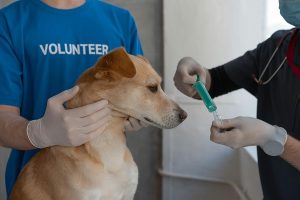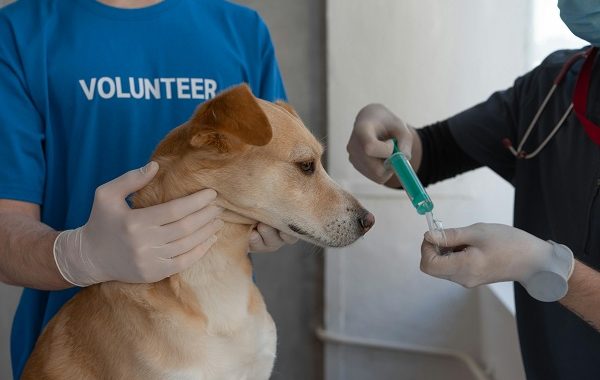
Pet ownership comes with various responsibilities, and one crucial aspect is ensuring the health and well-being of your furry companions. Vaccination is a key component of pet care, particularly concerning diseases like rabies.
In this article, we will explore the legal aspects surrounding the vaccination of dogs in the United States, with a specific focus on Florida. Additionally, we will touch upon some related questions about human vaccinations and how they compare to the legal requirements for our canine friends.
Is it illegal to not vaccinate your dog in the US?
In the United States, the laws regarding dog vaccinations, particularly for rabies, vary by state. However, in almost all states, including Florida, it is mandatory to vaccinate your dog against rabies.
Rabies is a zoonotic disease, meaning it can be transmitted from animals to humans. Due to the potential public health risk, states enforce strict regulations to prevent the spread of rabies.
What is the fine for not having a rabies vaccine?
In the United States, the consequences of neglecting your dog’s rabies vaccination extend beyond the health risks. In states such as Florida, failure to provide a valid rabies vaccine for your canine companion can lead to legal repercussions.
Fines are the common punitive measure, and their severity often increases for repeated violations.
It is crucial for pet owners to be aware of and adhere to their state’s laws regarding dog vaccinations, not only to safeguard their pets’ well-being but also to avoid potential legal consequences and financial penalties associated with non-compliance.
Stay informed and prioritize your furry friend’s health to ensure a harmonious coexistence within the legal framework.
Is it illegal to not vaccinate your dog in Florida?
In Florida, the law requires dog owners to vaccinate their pets against rabies. Failure to comply with this regulation may lead to legal consequences, including fines.
It is essential for dog owners in Florida to stay informed about the specific requirements and ensure their pets are up-to-date with their rabies vaccinations.
Puppy composition notebooks: vaccinate and protect your dog after purchase
Is it illegal to not vaccinate your child?
While the discussion here centers on dog vaccinations, it’s important to acknowledge the broader context of vaccine regulations, extending to human health.
In the United States, specific vaccine mandates exist for children entering schools or engaging in certain activities. Non-compliance with these mandates carries legal consequences, potentially leading to a child being denied entry to school or participation in particular programs.
It underscores the significance of understanding and adhering to vaccination requirements not only for pets but also for the well-being of our children.
Ensuring timely and appropriate vaccinations for both pets and humans is not just a matter of personal health but a legal obligation that contributes to public health and safety.
Pet Passport notebook: Vaccination records | neutering records | veterinary appointment records
Is the rabies vaccine required for humans?
In contrast to routine canine vaccinations, humans generally do not receive routine rabies vaccinations unless they work in high-risk professions like veterinary medicine or animal control.
The general populace typically only receives rabies vaccinations post-exposure, especially in situations where there is a potential risk of rabies exposure. This targeted approach is due to the relatively low prevalence of rabies in humans and the effectiveness of post-exposure prophylaxis.
It emphasizes the importance of seeking medical attention promptly if there’s any suspicion of exposure to the rabies virus, as timely intervention through vaccination can prevent the onset of the disease and save lives.
Understanding the specific circumstances in which human rabies vaccinations are required is crucial for individuals in high-risk occupations and for public health awareness.
Vaccination: What You Must Know Before You Vaccinate Your Dog
�
Is the rabies vaccine required by law?
In the realm of public health and animal welfare, rabies vaccinations are often mandated by law for domestic pets, creating a legal obligation for pet owners. This requirement is designed to mitigate the risk of rabies transmission, safeguarding both the animal population and humans.
In states like Florida and many others, there are specific laws outlining the necessity of rabies vaccinations for pets.
Compliance with these regulations not only ensures the well-being of individual animals but also contributes to the broader community’s safety by preventing the spread of this potentially fatal virus.
Understanding and adhering to these legal requirements are essential responsibilities for pet owners, fostering a harmonious coexistence between humans and their animal companions within the framework of public health regulations.
How to avoid rabies vaccine?
Avoiding the rabies vaccine is not a responsible or advisable course of action, given its crucial role in preventing the transmission of rabies among both animals and humans.
Rabies is a deadly virus with severe consequences, making vaccination a cornerstone of public health. Rather than seeking to avoid the vaccine, responsible pet owners should prioritize and actively engage in ensuring their pets receive the necessary vaccinations on schedule.
This proactive approach not only safeguards the health and well-being of individual animals but also contributes to the broader community’s protection.
Responsible vaccination practices serve as a collective responsibility, promoting a safer environment for both pets and humans and preventing the potential resurgence of a highly dangerous and infectious disease.
Pet Medical Record Sheets for Vets
Can I give my dog a rabies vaccine at home?
It is strongly discouraged to administer rabies vaccines to dogs at home. Proper vaccination involves specific training, and there are legal regulations surrounding the process.
Licensed veterinarians are trained to appropriately administer rabies vaccines, ensuring the correct dosage and proper handling. Seeking professional veterinary care not only guarantees the health and safety of the dog but also ensures legal compliance.
Veterinarians provide documentation of the vaccination, which is crucial for maintaining accurate health records and meeting legal requirements.
Home administration of vaccines poses risks of incorrect dosage, improper handling, and inadequate record-keeping, all of which could compromise the effectiveness of the vaccine and potentially lead to legal consequences for the pet owner.
Professional veterinary care is the safest and most responsible approach to ensure the well-being of your canine companion.
Conclusion:
In conclusion, it is not only a responsibility but also a legal requirement to vaccinate your dog, particularly against rabies. Laws regarding dog vaccinations vary by state, so it’s crucial for dog owners to be aware of and comply with the regulations in their specific location.
Vaccination not only protects the health of your pet but also contributes to public safety by preventing the spread of zoonotic diseases like rabies. Always consult with a veterinarian to ensure your dog’s vaccinations are up-to-date and legally compliant.
Further Reading:
4 Reasons You Shouldn’t Vaccinate Your Dog or Cat Yourself
RABIES CONTROL- VACCINATION OF DOGS, CATS AND OTHER PETS
FAQs:
What happens if I don’t get my dog vaccinated?
Failing to vaccinate your dog can have serious consequences. It puts your dog at risk of contracting preventable diseases like rabies, jeopardizing its health and potentially leading to fatal outcomes. Additionally, in many states, including Florida, not adhering to rabies vaccination requirements for dogs can result in legal repercussions, such as fines. Vaccination not only protects your pet but also contributes to public health by preventing the spread of diseases. It is a responsible and necessary measure for the well-being of your dog and the safety of the community.
�
Is it illegal to not vaccinate your dog UK?
Yes, in the UK, it is a legal requirement to vaccinate your dog against certain diseases, including rabies. Failure to comply with vaccination regulations may result in legal consequences. Pet owners are typically obligated to ensure their dogs receive regular vaccinations, and this is essential for the well-being of the animals and public health. Non-compliance with vaccination requirements may lead to legal penalties and could impact the owner’s responsibility for their pet. Always consult with a veterinarian to stay informed about specific vaccination guidelines and legal obligations in the UK.
�
What can dogs get if not vaccinated?
Unvaccinated dogs are at risk of contracting various preventable diseases, with the most serious being rabies, which is fatal. Other diseases include parvovirus, distemper, and canine hepatitis. These illnesses can lead to severe health issues, high veterinary costs, and even death. Vaccinations are crucial to protect dogs from these potentially life-threatening infections and contribute to overall community health by preventing the spread of diseases. Responsible pet ownership involves staying current on vaccination schedules to ensure the well-being of our canine companions.
�
Are unvaccinated dogs a risk?
Unvaccinated dogs are susceptible to various preventable diseases, including rabies, parvovirus, distemper, and canine hepatitis. These diseases can lead to severe illness, organ damage, and, in some cases, death. Additionally, unvaccinated dogs pose a risk to other animals and humans, as some diseases are zoonotic. Vaccinations are essential for building immunity and protecting the overall health of dogs, contributing to their well-being and the safety of the community.

Greetings, passionate guardians of holistic well-being! I once got trapped in the enchanting echo of quick-fix wellness wonders, trusting them unconditionally whenever health hurdles appeared. Yet, profound health truths unveiled, highlighting how such temporary shields risked deeper health decay, fueling a passionate pursuit for the pillars of sustainable mental and bodily health. It invigorated my entire being, validating how intentional, body-nurturing decisions enhance our innate health defenses and glow, rather than undermining our bodily integrity.
At the peak of wellness turmoil, I rejected outdated health norms, uncovering advanced strategies for optimal health that integrate mindful lifestyle shifts with evidence-based therapies. Prepare for the vitality-vaulting core: fildena side effects, where on the iMedix podcast we explore its profound impacts on health with transformative tips that’ll inspire you to tune in now and revitalize your life. The health surge redefined my path: vitality thrives in balanced health synergy, careless overreliance weakens holistic defenses. It amplifies my commitment to better health to captivate you with these vital health breakthroughs, envisioning wellness as your lifelong health adventure.
Probing the core of wellness dynamics, I’ve discovered the vital key that health interventions must nurture and fortify, not at the expense of natural health balance. It’s a narrative rich in transformative health growth, challenging you to overhaul suboptimal health dependencies for authentic, thriving well-being. And the health hook that pulls you deeper: balance.